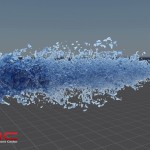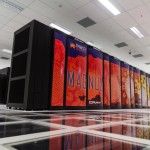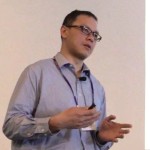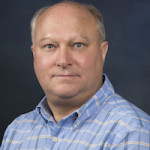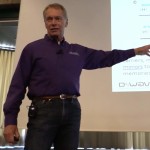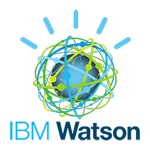In this video from the 2016 HPC Advisory Council Switzerland Conference, Addison Snell from Intersect360 Research moderates a panel discussion on Exascale computing. “Exascale computing will uniquely provide knowledge leading to transformative advances for our economy, security and society in general. A failure to proceed with appropriate speed risks losing competitiveness in information technology, in our industrial base writ large, and in leading-edge science.”
Archives for March 2016
SGI Provides Total with Improved Modeling to Support Decision Making
Total, one of the largest integrated oil and gas companies in the world, announced they are boosting the compute power of their SGI Pangea supercomputer with an additional 4.4 petaflops provided by a new SGI ICE X system and based on the Intel Xeon processor. Purchased last year, the new SGI system is now in production and will allow Total to determine the optimal extraction methods more quickly. The SGI supercomputer allows Total to improve complex modeling of the subsurface and to simulate the behavior of reservoirs, reducing the time and costs associated with discovering and extracting energy reserves.
IBM & LLNL Collaborate on TrueNorth Neuromorphic Computing
Today Lawrence Livermore National Laboratory (LLNL) announced it has purchased a first-of-a-kind brain-inspired supercomputing platform for deep learning inference developed by IBM Research. Based on a breakthrough neurosynaptic computer chip called IBM TrueNorth, the scalable platform will process the equivalent of 16 million neurons and 4 billion synapses and consume the energy equivalent of a tablet computer – a mere 2.5 watts of power for the 16 TrueNorth chips. The brain-like, neural network design of the IBM Neuromorphic System is able to infer complex cognitive tasks such as pattern recognition and integrated sensory processing far more efficiently than conventional chips.
Supercomputing Complex Diesel Injection Mist at Army Research Lab
The ability to study complex interactions inside a diesel engine gives Army scientists a new perspective that may help design more fuel efficient and effective engines. Using state-of-the-art supercomputers, Army scientist Dr. Luis Bravo led efforts to create simulations highlighting the first year of his project, allowing them to investigate the jet fuel spray breakup process with microsecond time fidelity and sub-millimeter resolution, while generating petabytes of data.
Interview: Pawsey Supercomputer Centre Propels Science Down Under
“As the most powerful public research supercomputer in the southern hemisphere, Magnus supports several hundred research projects led by researchers from Australian academic and research institutions. As a Cray XC40 system, Magnus provides a petascale supercomputing environment for a diverse range of application areas, such as energy and resources, food security, ground water modeling, climate modeling, astronomy and astrophysics, genomics, and advanced manufacturing.”
Video: Best Practices – Applications Performance Optimizations
Pak Lui from the HPC Advisory Council presented this talk at the Switzerland HPC Conference. “To achieve good scalability performance on the HPC scientific applications typically involves good understanding of the workload though performing profile analysis, and comparing behaviors of using different hardware which pinpoint bottlenecks in different areas of the HPC cluster.”
Podcast: For Data Network Effects, the Cool Stuff Only Happens at Scale
In this a16z Podcast, Vijay Pande and Alex Rampell share their observations and advice on all things data network effects. “If network effects are one of the most important concepts for software-based businesses, then that may be especially true of data network effects — a network effect that results from data.”
Gary Grider from LANL to Keynote OpenFabrics Workshop
Gary Grider from Los Alamos National Laboratory will keynote the 2016 OpenFabrics Workshop this year with a talk on HPC Storage and IO Trends and Workflows. The event takes place April 4-8, 2016 in Monterey, California.
Bo Ewald Presents: The Quantum Effect – HPC Without FLOPS
Bo Ewald from D-Wave Systems presented this talk at the HPC Advisory Council Switzerland Conference. “This talk will provide an introduction to quantum computing and briefly review different approached to implementing a quantum computer. D-Wave’s approach to implementing a quantum annealing architecture and the software and programming environment will be discussed. Finally, some potential applications of quantum computing will also be addressed.”
IBM Partners with University of Aberdeen to Drive Cognitive Computing
The University of Aberdeen has become the first Scottish university to partner with IBM to offer students and staff access to its cognitive computing technology. “Cognitive represents an entirely new model of computing that includes a range of technology innovations in analytics, natural language processing and machine learning. The collaboration between IBM and the University of Aberdeen, which builds on a long-standing relationship, aims to help nurture the next generation of innovators and is the first initiative of this type in Scotland.”



